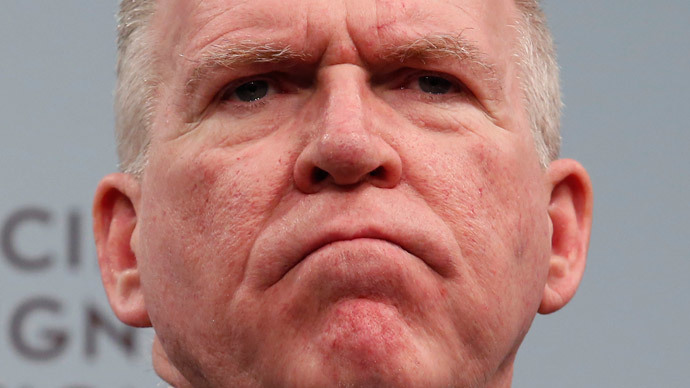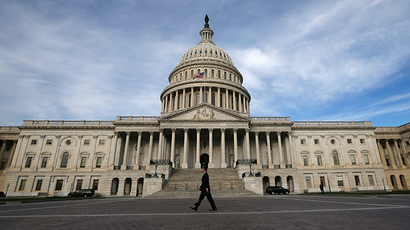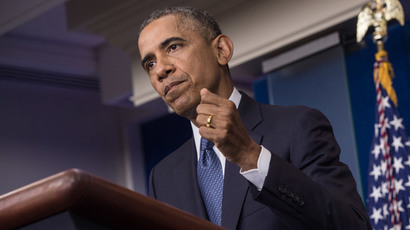‘No we did not’: Spy chief denies CIA hacked Senate emails on torture investigation

The director of the CIA is openly frustrated with the media and the Senate for their criticism of the agency. This comes just ahead of the release of an upper house report on torture and follows Langley’s alleged hacking into committee emails.
John Brennan, speaking to an intelligence panel at a conference, has pledged to win back public trust because “having [it] makes all of our jobs much easier and better.” But he also said that he disagrees with “the narratives floating around the media” regarding the use of covert and illegal rendition of suspects and the public’s strong disagreement with them.
But unlike the public, the relationship with his overseers at the Senate is a more complex one, and it took a turn for the worse after the CIA was earlier caught red-handed while bypassing a network firewall that the Senate had been using to gather relevant CIA documents for its inquiry into its practices of covert torture.
READ MORE:White House torture report withholding critical facts, says top senator
In 2009, the Senate Intelligence Committee set about compiling a comprehensive review of the agency’s practices regarding detention and interrogation, which included waterboarding and other methods, normally carried out at secret prisons overseas.
The upcoming 6,000-page report purports to show that the CIA deliberately misled the Congress, the Justice Department and the White House on the successes of such methods.
President Barack Obama ended the program in 2009, but only in 2012 did the committee vote to declassify parts of it. The CIA was really unhappy, writing a 122-page response with suggestions of corrections. But the upcoming release is being marred by more things than just the contents.
The investigative committee’s chair, Democrat Diane Feinstein, said in March 2014 that the CIA “just went and searched the committee’s computers,” referring to the agency’s attempts to gain insight into the investigation.

Initially denying the allegations, Brennan had to backtrack in July and admit to everything after it was determined that the CIA was indeed fishing for keywords in Senate staffer emails – a federal violation.
READ MORE:Obama on CIA’s post-9/11 tactics: ‘We tortured some folks’
The situation is repeating itself, however: the CIA director now flatly denies that the entire revelation incident played out the way Feinstein had said.
“This is part of the mischaracterizations. The Council on Foreign Relations, [moderator] Andrea Mitchell, said, ‘did in fact CIA officers hack into the Senate computers to thwart the investigation on potential interrogation?’ Thwart the investigation, hacking in – no, we did not, and I said that’s beyond the scope of reason,” he claimed.
“When the inspector general determined that based on the common understanding between the CIA and the [committee] about this arrangement of computers, that our officers had improperly accessed it, even though these were CIA facilities, CIA computers, and CIA had responsibility for the IT integrity of the system, I apologized to them for any improper access that was done, despite the fact that we didn’t have a memorandum of agreement,” Brennan explained.
“What I’ve said to the committee and others is that if I’ve done something wrong, I’ll stand up and admit it, but I’m not going to take, you know, the allegations about hacking and monitoring and spying and whatever else, no. … When I think about that incident, I think there are things on both sides that need to be addressed,” he said.
The heat between the CIA director and the Senate committee is picking up steam, with the latter planning to release a partially declassified report on the agency’s post-9/11 interrogation methods, widely expected to counter the Bush-era claims that rendition was an effective technique. Before the document is even out, many in the Republican circles have already rejected it.
As Brennan defended the CIA, he was also joined by other agency heads from the NSA, the National Geospatial-Intelligence Agency (NGA) and the Defense Intelligence Agency (DIA.)
READ MORE:Confirmed: CIA spied on Senate staff
The NSA’s new director, Michael Rogers, likewise felt an undue amount of suspicion being directed at the agency under his command, following widespread and far-reaching allegations of data mining and all sorts of electronic surveillance on people at home and oversees.
“There should be no doubt in anyone’s mind that I am watching groups change their behavior as a direct result of these revelations, groups that represent a direct threat to the citizens of this nation and those of our friends and allies,” Rogers said, reiterating the popular defense that government practices are for the nation’s own good and are far less malevolent than the potential enemies that are uncovered in the process.
However he admitted that the agency was slow to pick up on the threat posed by the Islamic State terrorists, however.
“I wish we had been a little stronger on it,” said Rogers.














